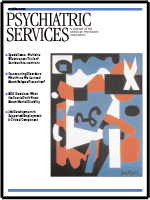Special Section on Relapse Prevention: Future Directions in Preventing Relapse to Substance Abuse Among Clients With Severe Mental Illnesses
Abstract
The authors review the literature on substance use disorders among persons with severe mental illnesses, including the other papers in this special section on relapse prevention, and suggest future directions. Although prevention of relapse to substance abuse has a well-developed theoretical and empirical base, this perspective has rarely been applied to persons with co-occurring severe mental illness. Research indicates that clients with co-occurring disorders are highly prone to relapse to substance abuse, even after they have attained full remission. Their risk factors include exacerbations of mental illness, social pressures within drug-using networks, lack of meaningful activities and social supports for recovery, independent housing in high-risk neighborhoods, and lack of substance abuse or dual diagnosis treatments. The evidence in hand suggests several steps: developing healthy and protective environments that are experienced as nurturing of recovery; helping people make fundamental changes in their lives, such as finding satisfying jobs, abstinent friends, networks of people who are in the process of recovery, and a sense of meaning; providing specific and individualized treatments for mental illnesses, substance use disorders, and other co-occurring problems; and developing longitudinal research on understanding and preventing relapse that addresses social context as well as biological vulnerabilities and cognitive strategies.



